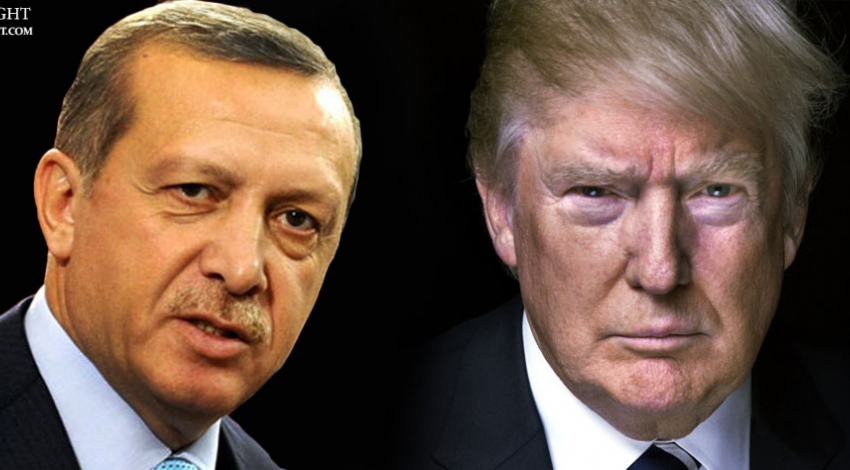Monday 14 November 2016 - 16:10
Story Code : 239128
Kurdish Cause: Future key Erdogan-Trump sticking point
Alwaght- Since 1984 when the PKK (Kurdistan Workers' Party) was founded to struggle for the rights of the Kurdish minorities in the southeastern regions of Turkey, Ankara has been grappling with the Kurdish challenge in its policies.
The over 40-year clashes between PKK and the Turkish forces have claimed lives of thousands people from both sides, however, the Kurdish militant group has never� even for a while� stopped pursuing its ideals and goals.
When Recep Tayyip Erdogan rose to power as a prime minister in the country in 2002, he tried to reach a deal for peace with PKK. The efforts for peace led the two sides to announce a cessation of hostility in 2013. During the 2-year period of peace accord, the terms were violated several times under different excuses. Finally, in 2015, the Turkish fighter jets bombed the Qandil Mountains in Iraq where Ankara believed the Peshmerga forces of PKK were camping. This was death of the peace agreement.
Following the Kurdish People�s Democratic Party's victory and crossing the 10 percent threshold to get into the parliament, government began to grow worries about Kurdish gain of power in the country�s politics. The Turkish officials recognize the party as the civilian branch of PKK. This branding gave the Turkish government the necessary excuses to move to contain the leaders of the People�s Democratic Party after a failed army coup attempt against President Erdogan in July this year.
Erdogan regards the Kurdish power gaining as posing serious threats to his agenda at home and abroad. He believes that through their influence in the country�s political structures, the Kurds will set up hurdles ahead of his plans for re-designing the Turkish political system from parliamentary to presidential, as at the same time they will, according to the Turkish president's beliefs, thwart his neo-Ottoman dreams. Furthermore, he is concerned that once they gain grounds in the country in the future, they could follow the Iraqi Kurds' steps and seek autonomy.
Ankara is closely watching the Turkish conditions at home while in the neighboring Syria the Kurdish People�s Protection Units (YPG) forces that fight against the ISIS terrorist group are also seen by the Turkey as affiliates of the PKK. The Turkish government argues that the YPG as the military branch of the Syrian Democratic Union Part is linked to the PKK, therefore, even its advances against the ISIS in Syria could sounds the alarms for Ankara.
On the other side, due to their fighting capabilities, Washington looks at the Kurds as the infantry of the US-led anti-ISIS international military coalition. The US President Barack Obama argued why the American support should go to the other groups while the Kurdish forces can battle well against ISIS on the ground.
The US president�s argument could possibly lead to Washington�s increased aids to the YPG forces, a policy that is certainly in conflict with Ankara�s will. To contain popularity and upper hand of the YPG in the Syrian battlegrounds, Ankara deployed its military forces to launch Operation Euphrates Shield in northern Syria. Earlier, the Turkish air force had bombed the PKK's positions in Syria and Iraq under the cover of anti-ISIS air raids. The Turkish leaders argue that PKK is a backer of the Syrian People�s Protection Units.
While Turkey�s entry to Syria and Iraq is related to the Ottoman Empire�s rule over these two countries, the Ankara-Erbil relations are experiencing quiet and peaceful times. Turkey currently holds over 1000 military personnel in Iraq�s north who are responsible for training the police forces as well as the voluntary forces to prepare them for battling ISIS terrorist group. On the other side, the Iraqi Kurdistan region has managed to raise money to run its autonomous government through oil sales to Turkey. This can help formation of Iraq�s partition by Turkey.
Providing military and financial support to Erbil, the Turkish leaders have kept the Kurdistan region of Iraq from recognizing the newly established Kurdish cantons in northern Syria. This, in turn, broadened the gaps between PKK and Erbil government. In fact, widening gaps between the two sides, diminishes chances for establishment of Syrian Kurdish region. At the same time, Turkey believes that the Iraqi Kurdistan regional government�s nationalistic plans pose less threats to Ankara than do the plans of the Syrian Kurds. This is because the Kurds of Turkey are closer to PKK and Democratic Union Party than to Iraq�s Kurdistan government.
Additionally, the Turkish leaders are well aware that should a second autonomous Kurdish region be established on Turkey�s southern borders, the political conditions in the Kurdish-inhabited areas of Turkey will go more dangerous and complicated. So, it seems that Turkey goes to great lengths to block a federal system in Syria or Syrian Kurds' power gaining in the country�s political stage. This could deepen Ankara-Washington's differences.
Erdogan knows well that any backing down in this case could expose to risks his plans for forming a strong Turkish republic, and even the odds are that the Kurds win further seats in the upcoming parliamentary elections.
Therefore, although Turkey welcomed victory of Donald Trump in the US presidential election, the future will witness the two countries' rifts over the Syrian crisis and the Kurdish cause.
# Tags











